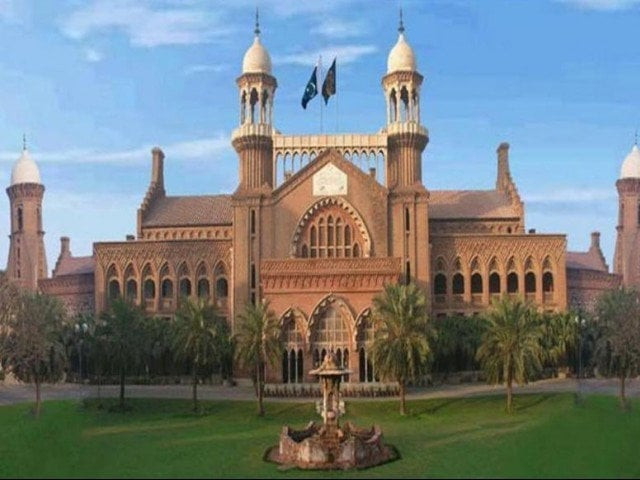Lahore High Court petition seeks enforcement of Supreme Court’s reserved seats verdict
Petitioner argues that despite apex court’s detailed decision, PTI has not been awarded its reserved seats.

A petition has been filed in the Lahore High Court seeking enforcement of the Supreme Court’s decision on reserved seats for Pakistan Tehreek-e-Insaf (PTI).
The petition comes after the Supreme Court issued a detailed verdict on the matter.
Filed by Munir Ahmed, the petition calls on the court to direct the implementation of the Supreme Court’s ruling, which was delivered by an eight-member bench.
The petitioner argues that despite the court’s detailed decision, it has not yet been acted upon, and PTI has not been awarded its reserved seats in the provincial assemblies.
The petition also notes that letters have been sent to the speakers of all four provincial assemblies, but the seats remain unallocated to PTI.
The Lahore High Court has been asked to ensure the implementation of the Supreme Court’s ruling, allowing PTI to receive its reserved seats as per the court’s decision.
SC held that the ECP failed to perform its role as a “guarantor institution” of democratic processes
The Supreme Court of Pakistan has issued a detailed 70-page verdict declaring the Election Commission of Pakistan's (ECP) decision on reserved seats unconstitutional.
The judgment, written by Justice Mansoor Ali Shah, also annulled a previous ruling by the Peshawar High Court (PHC), affirming that the reserved seats should be allocated to Pakistan Tehreek-e-Insaf (PTI).
The verdict was delivered by an 8-5 majority of a full bench led by Chief Justice Qazi Faez Isa. Judges like Justices Yahya Afridi, Aminuddin Khan, Jamal Khan Mandokhail, and Naeem Akhtar Afghan dissented, emphasising the importance of proportional representation.
"We find it important to emphasize that the Commission, as a constitutional “electoral management body”, is not merely an administrative entity but a fundamental “guarantor institution” of democratic processes, with a constitutional status akin to a “fourth branch of government”.
The Commission must therefore fully recognize its constitutional position and the critical role it plays in a democracy while performing its duty to conduct free and fair elections. As a central pillar of democratic electoral processes, the Commission, in its role as a guarantor institution and impartial steward is tasked with ensuring the transparency and fairness of elections to maintain public trust in the electoral system. This is essential for the legitimacy of elected representatives and the stability of the political system.
The Commission must uphold democratic principles and the integrity of electoral processes by ensuring that elections truly reflect the will of the people, thereby preserving the democratic fabric of the nation.
Unfortunately, the circumstances of the present case indicate that the Commission has failed to fulfill this role in the General Elections of 2024", says 70 pages of detailed judgment authored by Justice Syed Mansoor Ali in the reserved seats case.
Eight judges in the majority judgment said that surprised us during the proceedings of these appeals are the way the Commission participated in and contested the matter before us as a primary contesting party against SIC and PTI. We are aware that the Commission’s prime function, under Article 218(3) of the Constitution, is to ‘organize and conduct the election and to make such arrangements as are necessary to ensure that the election is conducted honestly, justly, fairly, and in accordance with law, and that corrupt practices are guarded against.
This function of the Commission, ‘to organize and conduct the election’, as held by this Court in Aam Log Itehad, 81 is primarily executive, not judicial or quasi-judicial. However, as found in the said case, the Commission also performs some quasi-judicial functions.
In the present case, several political parties made counterclaims regarding their right to the disputed reserved seats, and the Commission decided these counterclaims as an adjudicatory body. The function performed by the Commission in the present case was, therefore, quasi-judicial. And, as held by this Court in Wafaqi Mohtasib 82 and A. Rahim Foods, 83 A body performing its quasi-judicial function in a matter between two rival parties cannot be treated as an aggrieved person if its decision is set aside or modified by a higher forum or by a court of competent jurisdiction.
Such a body, therefore, does not have locus standi to challenge the decision of that higher forum or court. Nor, we may add, can such a body contest an appeal filed against its quasi judicial decision by one of the rival parties as a primary contesting party. In the present case, the Commission was a proper party to assist the the court ineffectually and completely adjudicated upon and settled all the questions involved in the case. It should have acted in this manner, not as a primary contesting party.
When the Election Commission errs or makes significant mistakes impacting the electoral process, judicial intervention becomes necessary to rectify them and ensure electoral justice. The judiciary, tasked with ensuring electoral justice, must foremost preserve the people's will. Election disputes are viewed through this lens, emphasizing electoral integrity and democracy’s legitimacy to maintain public confidence in governance.
Electoral justice is vital to protecting political and electoral rights and is intertwined with electoral integrity. The role of the Supreme The Court of Pakistan in overseeing electoral integrity is crucial for sustaining public trust in the democratic process, and the Court’s power to do “complete justice” is a critical tool in the constitutional arsenal of this Court, enabling it to prevent democratic backsliding,4 and protect democracy effectively with a focus on the electorate’s rights. Denying electoral justice and compromising electoral integrity would undermine the very legitimacy of democracy.
Elections are a crucial part of the democratic process, and the public has a major stake in ensuring that they are held free and fair, unmarred by corrupt or illegal practices. Therefore, unlike ordinary civil cases, election cases involve substantial public interest. An election dispute is fundamentally different from other civil disputes, as it is not solely a dispute between two contesting parties but a proceeding where the constituency itself is the principal interested party. These cases involve not just the rights of the contesting candidates or political parties but also the rights of the voters, constituencies, and the public.
Election cases aim to fill public offices with properly qualified and duly elected candidates and to maintain the purity of elections, ensuring that no one takes charge of a public office through flagrant breaches of election laws or corrupt practices. The proceedings in election cases thus have unique characteristics because they serve the interests of the entire constituency, differentiating them from ordinary civil proceedings. This distinction clearly demonstrates the flaw in treating an election case as an ordinary civil case and limiting the judicial inquiry to the pleadings of the parties as it is in adversarial proceedings.
In a democratic context, freedom of expression extends beyond individual speech to encompass the collective expression of a community’s or nation’s political will through their electedrepresentatives. In essence, freedom of expression and representativeness is deeply interlinked, each reinforcing the other. A truly representative government not only exemplifies the collective expression of its people but also ensures that this expression influences governance.
The right to form political parties, the right to contest elections and the right to vote are therefore pivotal extensions of representativeness and freedom of expression, essential for cultivating a socially just environment. The fundamental rights enshrined in Articles 17(2) and 19 of the Constitution thus underscores the significance of political participation and freedom of expression, both of which are essential to the functioning of a representative democracy. Article 17(2) guarantees the right to form or join political parties, highlighting the vital role of political participation in safeguarding democracy, while Article 19 upholds the freedom of expression, which is integral to the electorate’s ability to influence the formation of government by expressing their choices through their votes.
Together, these Articles emphasize the importance of electoral integrity and political justice, ensuring that every citizen’s voice and choice are heard and represented in the political process. In light of the foregoing interpretation, we determine the question (i) in the terms that the sole consequence of declaring a political party ineligible to obtain an election symbol under Section 215(5) of the Elections Act for failing to comply with the provisions of Section 209 regarding intra-party elections is the non-allocation of an election symbol to that party in subsequent elections—nothing more, nothing less.
Furthermore, such a declaration does not affect the political party’s other constitutional and statutory rights. 37.This was the effect of the Commission’s order dated 22 December 2023 (upheld by this Court vide its order dated 13 January 2024), declaring PTI ineligible to obtain its election symbol under Section 215(5) of the Elections Act; other constitutional and statutory rights of PTI to function and operate as a political party were not thereby affected. With respect, it is observed that had this Court clarified this legal position in its order dated 13 January 2024, or had the Commission clarified it in its order dated 22 December 2023 or order dated 13 January 2024, the entire confusion regarding the status of PTI candidates or PTI’s right to reserved seats would not have occurred.
We feel constrained to observe here that we have some doubts about whether the Commission has the power to reject the certificate of intra-party elections submitted by a political party under Section 209, and whether the Commission exercised its discretion under Section 215(5) justly, fairly, and reasonably in PTI’s case, particularly when the election programme had already been announced and the fundamental right of citizens to vote for the political party of their choice was at stake.
Similarly, we have certain reservations about how the matter of intraparty elections—a matter of internal governance of a party—can trump the fundamental rights of citizens to vote and of political parties to effectively participate in and contest elections by obtaining a common symbol for their candidates, guaranteed under Articles 17(2) and 19 of the Constitution. However, since these questions are sub judice in the review petition filed by PTI against this Court’s judgment dated 13 January 2024, we abstain from examining and expressing our definitive view on them. (One of us, Justice Muhammed Ali Mazhar, does not want to make the observations made in this paragraph because of the review petition against this Court’s judgment dated 13 January 2024 is pending. He also wishes to make clear that nothing in this paragraph is intended to or will impact upon the hearing of the review petition)



















COMMENTS
Comments are moderated and generally will be posted if they are on-topic and not abusive.
For more information, please see our Comments FAQ